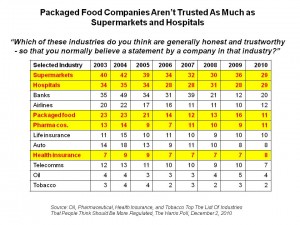 “Can Walmart Make America Eat Healthier?” asks The Week.
“Can Walmart Make America Eat Healthier?” asks The Week.
Walmart, the world’s largest retailer and #1 company on the Fortune 500 list, has come out in favor of bolstering health in the food it sells through its 800+ discount stores, 2,700 supercenters, 158 neighborhood markets, and nearly 600 Sam’s Clubs in the U.S.
The Financial Times today reported that the company’s plan won the compliments of First Lady Michelle Obama, who is a proponent of healthy and local foods and was present at Walmart’s announcement. The company’s stock price is up over a dollar today, probably based on this news and the patina it gives the Walmart brand that typically embodies the Big Food industry: high-fat, sodium-packed, white-carb, super-sized and-caloried foodstuffs.
Walmart plans to:
- Reduce sodium by 25 percent in a variety of grocery items, including grain products, luncheon meats, salad dressings and frozen entrees;
- Reduce added sugars by 10 percent in dairy items, sauces and fruit drinks; and
- Remove all remaining industrially produced trans fats (partially hydrogenated fats and oils) in all packaged food products.
This story has been covered in hundreds of media outlets: NPR called the rationale behind the announcement “healthy business logic.” Barron’s blog said the plan would cut consumers’ costs and waistlines (Walmart said they’d try to price the new-and-improved healthy foods as low as possible to make them accessible to their shopper). Huffington Post said the plan “could save lives.”
 Health Populi’s Hot Points: Big Food as an industry sector has lately been placed in a similar segment to Big Oil, Big Tobacco, and Big Pharma in the eyes of consumers compared with more beloved industries — most especially supermarkets and hospitals, as illustrated by this chart from a Harris Poll conducted in December 2010.
Health Populi’s Hot Points: Big Food as an industry sector has lately been placed in a similar segment to Big Oil, Big Tobacco, and Big Pharma in the eyes of consumers compared with more beloved industries — most especially supermarkets and hospitals, as illustrated by this chart from a Harris Poll conducted in December 2010.
Health is the new green, according to the 2010 Edelman Health Engagement Barometer. The survey found that consumers the world over, including Americans, look for health support and messaging from virtually every industry segment with whom people deal. Beyond pharma companies, over-the-counter consumer health companies, and hospitals, most people seek ‘health’ from food, beverage and brewing companies, as shown in the chart. (For more on this study, see Health Populi’s post on the HEB here). Supermarkets can be a trusted health hub in their local communities.
Food is inseparable from health; and supermarkets are beloved (ask Alec Baldwin, the actor, who is featured in a broadcast campaign for Wegmans, the Rochester NY-based grocery chain, because his mother loves the store). Wegmans began to place frozen fruit in their stores’ pharmacy aisles as part of their “eat well, live well” campaign.
For Walmart, a move toward more health-ful products helps the company further solidify its already-strong presence in health and health care. By doing so, the strategy can also do both the company and its customers good at the same time for fiscal and physical health, respectively. And for Walmart’s image, there will be an ROI, as well.




 I am so grateful to Tom Lawry for asking me to pen the foreword for his book, Health Care Nation,
I am so grateful to Tom Lawry for asking me to pen the foreword for his book, Health Care Nation,  I love sharing perspectives on what's shaping the future of health care, and appreciate the opportunity to be collaborating once again with Duke Corporate Education and a global client on 6th May. We'll be addressing some key pillars to consider in scenario planning such as growing consumerism in health care, technology (from AI to telehealth), climate change, and trust -- the key enabler for health engagement or dis-engagement and mis-information. I'm grateful to be affiliated with the corporate education provider
I love sharing perspectives on what's shaping the future of health care, and appreciate the opportunity to be collaborating once again with Duke Corporate Education and a global client on 6th May. We'll be addressing some key pillars to consider in scenario planning such as growing consumerism in health care, technology (from AI to telehealth), climate change, and trust -- the key enabler for health engagement or dis-engagement and mis-information. I'm grateful to be affiliated with the corporate education provider  Thank you FeedSpot for
Thank you FeedSpot for